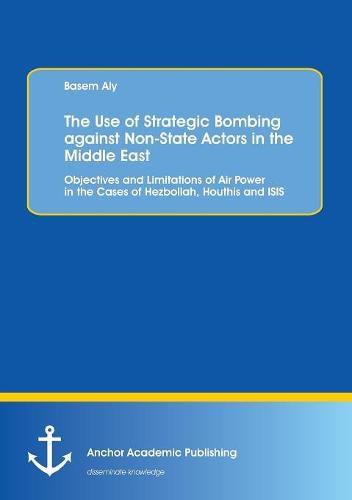Readings Newsletter
Become a Readings Member to make your shopping experience even easier.
Sign in or sign up for free!
You’re not far away from qualifying for FREE standard shipping within Australia
You’ve qualified for FREE standard shipping within Australia
The cart is loading…






This title is printed to order. This book may have been self-published. If so, we cannot guarantee the quality of the content. In the main most books will have gone through the editing process however some may not. We therefore suggest that you be aware of this before ordering this book. If in doubt check either the author or publisher’s details as we are unable to accept any returns unless they are faulty. Please contact us if you have any questions.
In the last decades, states revealed a tendency for expanding their dependence on so-called strategic bombing in wars against other states, an approach that raised questions on whether it is possible to reduce the involvement of ground and naval forces in future military confrontations. The successful employment of strategic bombing as the major pillar of military operations that took place within different geographical areas and terrains encouraged states to limit or altogether avoid resorting to campaigns that involve putting their boots on the ground. As a matter of fact, one can claim that improvements in the military aircraft industry - including persistent research on issues of technology, effectiveness and accuracy - have pushed for this result. Another set of reasons, however, that are indirectly connected to developments in aerial capabilities of militaries should not be ignored, including demands by governments for shorter, less costly wars, concerns about public opinion and electoral implications, as well as the fear of high rates of casualties. Airmen, meanwhile, were also called to implement strategic bombing operations against non-state actors. Yet, the outcome is certainly an issue of debate. In general, launching air strikes on states differs on many levels from aerially attacking militant organizations, terrorist groups or local tribes. Armies are fundamentally trained to fight against other armies, in addition to the difficulties of differentiating between civilians and militants, the so-called principle of discrimination. This study seeks to examine both the rationale and objectives of states in resorting to air power against non-state actors in the Middle East, focusing on the three cases of aerial operations on Hezbollah in Lebanon, ISIS in Syria, and the Houthi rebels in Yemen.
$9.00 standard shipping within Australia
FREE standard shipping within Australia for orders over $100.00
Express & International shipping calculated at checkout
This title is printed to order. This book may have been self-published. If so, we cannot guarantee the quality of the content. In the main most books will have gone through the editing process however some may not. We therefore suggest that you be aware of this before ordering this book. If in doubt check either the author or publisher’s details as we are unable to accept any returns unless they are faulty. Please contact us if you have any questions.
In the last decades, states revealed a tendency for expanding their dependence on so-called strategic bombing in wars against other states, an approach that raised questions on whether it is possible to reduce the involvement of ground and naval forces in future military confrontations. The successful employment of strategic bombing as the major pillar of military operations that took place within different geographical areas and terrains encouraged states to limit or altogether avoid resorting to campaigns that involve putting their boots on the ground. As a matter of fact, one can claim that improvements in the military aircraft industry - including persistent research on issues of technology, effectiveness and accuracy - have pushed for this result. Another set of reasons, however, that are indirectly connected to developments in aerial capabilities of militaries should not be ignored, including demands by governments for shorter, less costly wars, concerns about public opinion and electoral implications, as well as the fear of high rates of casualties. Airmen, meanwhile, were also called to implement strategic bombing operations against non-state actors. Yet, the outcome is certainly an issue of debate. In general, launching air strikes on states differs on many levels from aerially attacking militant organizations, terrorist groups or local tribes. Armies are fundamentally trained to fight against other armies, in addition to the difficulties of differentiating between civilians and militants, the so-called principle of discrimination. This study seeks to examine both the rationale and objectives of states in resorting to air power against non-state actors in the Middle East, focusing on the three cases of aerial operations on Hezbollah in Lebanon, ISIS in Syria, and the Houthi rebels in Yemen.